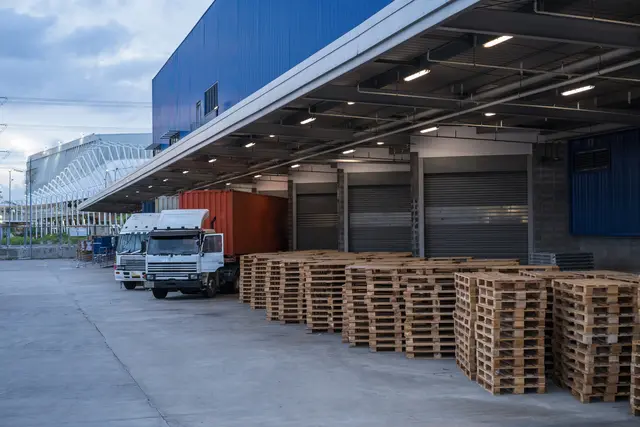Humanizing Dock Scheduling with Intelligent Automation
In the fast-paced world of supply chain management, every minute counts. Dock scheduling, a crucial aspect of warehouse operations, can often become a bottleneck, leading to inefficiencies and delays. Dock Scheduling Automation emerges as a game-changer, leveraging the power of Python, AI, and cloud-based solutions to streamline this process and unlock unprecedented efficiency.
Dock Scheduling Automation empowers businesses to optimize dock utilization, minimize truck wait times, and reduce congestion at loading docks. By automating the scheduling of dock appointments, businesses can eliminate manual errors, improve communication with carriers, and gain real-time visibility into their dock operations. This not only enhances operational efficiency but also fosters a collaborative environment among stakeholders.

The Power Trio: Python, AI, and Cloud for Dock Scheduling Automation
Dock Scheduling Automation thrives on the synergy between Python, AI, and cloud-based solutions. Python, a versatile and robust programming language, plays a pivotal role in developing both unattended and attended bots.
Unattended Bots: The Silent Workhorses
Unattended bots, powered by Python, work tirelessly behind the scenes, automating repetitive tasks such as:
- Monitoring dock schedules and availability
- Notifying carriers of available time slots
- Sending automated confirmation and reminder notifications
These bots ensure that dock scheduling runs smoothly, eliminating the need for manual intervention and reducing the risk of errors.
Attended Bots: Empowering Human Operators
Attended bots, also built with Python, assist human operators in real-time. They provide:
- Real-time updates on dock availability
- Automated suggestions for optimal dock assignments
- Assistance with exception handling and edge cases
Attended bots empower operators with the information and tools they need to make informed decisions, leading to increased efficiency and productivity.
Cloud Platforms: The Orchestrators
Cloud platforms, with their vast array of features and capabilities, serve as powerful orchestrators for Dock Scheduling Automation. They offer:
- Scalability to handle large volumes of dock scheduling requests
- Integration with other supply chain systems
- Advanced analytics for data-driven decision-making
Cloud platforms provide a centralized hub for managing and monitoring dock scheduling operations, ensuring seamless coordination and optimization.
AI: The Edge-Case Handler
AI techniques, such as image recognition, natural language processing (NLP), and generative AI, enhance the accuracy and robustness of Dock Scheduling Automation. They enable bots to:
- Extract data from unstructured documents (e.g., purchase orders)
- Understand and interpret natural language requests
- Generate intelligent recommendations based on historical data
By incorporating AI, dock scheduling automation becomes more adaptive and capable of handling complex edge cases, further improving operational efficiency.

Crafting the Dock Scheduling Automation Masterpiece
Building a robust Dock Scheduling Automation system involves a meticulous development process, leveraging the power of Python and cloud platforms. Let’s delve into the key steps:
1. Process Analysis: Deconstructing the Workflow
We begin by thoroughly analyzing the existing dock scheduling process, identifying each subprocess and its dependencies. This granular understanding forms the foundation for automation.
2. Python Script Development: Automating Subprocesses
Using Python’s versatility, we develop scripts to automate each subprocess. These scripts handle tasks such as:
- Extracting data from dock schedules
- Matching carrier requests with available time slots
- Sending automated notifications and reminders
3. Cloud Integration: Orchestrating the System
We integrate our Python scripts with a cloud platform to create a centralized orchestration system. The cloud platform provides:
- Scalability for handling high volumes of requests
- Data storage and management capabilities
- Real-time monitoring and analytics
4. Data Security and Compliance: Protecting Sensitive Information
Data security is paramount in supply chain operations. We implement robust security measures to protect sensitive data, such as:
- Encryption of data at rest and in transit
- Role-based access controls
- Compliance with industry regulations
5. Python vs. No-Code RPA Tools: A Comparative Advantage
While no-code RPA tools offer simplicity, they often lack the flexibility and customization capabilities of Python. Python allows us to:
- Handle complex edge cases and exceptions
- Integrate with a wider range of systems
- Leverage advanced AI techniques
Algorythum’s Python-Centric Approach: Unlocking Value
Algorythum takes a Python-centric approach because we believe in delivering tailored, high-performance automation solutions. Our clients have experienced dissatisfaction with off-the-shelf automation platforms due to:
- Limited customization options
- Performance bottlenecks
- Lack of support for complex integrations
By embracing Python, we overcome these limitations, empowering our clients with Dock Scheduling Automation systems that are:
- Flexible and adaptable to their unique requirements
- Scalable to meet growing demands
- Capable of handling complex scenarios with ease

The Future of Dock Scheduling Automation
The future of Dock Scheduling Automation holds exciting possibilities, as new technologies emerge and converge. Here are a few potential enhancements to consider:
- Integration with IoT devices: Real-time data from IoT sensors can provide insights into dock utilization, truck arrival times, and other factors, enabling more precise scheduling and resource allocation.
- Blockchain technology: Blockchain can enhance data security and transparency, facilitating collaboration among carriers, logistics partners, and other stakeholders.
- Predictive analytics: Machine learning algorithms can analyze historical data to predict future demand and optimize dock scheduling based on anticipated volumes and patterns.
To stay abreast of the latest advancements in Dock Scheduling Automation and other industry-specific automation solutions, subscribe to our newsletter.
If you’re ready to transform your dock scheduling operations, contact our team today for a free feasibility assessment and cost estimate tailored to your unique requirements. Together, we can unlock the full potential of Dock Scheduling Automation and drive efficiency and productivity in your supply chain.

Algorythum – Your Partner in Automations and Beyond
At Algorythum, we specialize in crafting custom RPA solutions with Python, specifically tailored to your industry. We break free from the limitations of off-the-shelf tools, offering:
- A team of Automation & DevSecOps Experts: Deeply experienced in building scalable and efficient automation solutions for various businesses in all industries.
- Reduced Automation Maintenance Costs: Our code is clear, maintainable, and minimizes future upkeep expenses (up to 90% reduction compared to platforms).
- Future-Proof Solutions: You own the code, ensuring flexibility and adaptability as your processes and regulations evolve.









